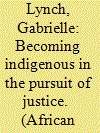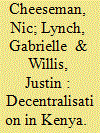|
|
|
Sort Order |
|
|
|
Items / Page
|
|
|
|
|
|
|
| Srl | Item |
| 1 |
ID:
110890


|
|
|
|
|
| Publication |
2012.
|
| Summary/Abstract |
The February 2010 ruling of the African Commission on Human and Peoples' Rights on the Kenyan government's violation of the Endorois people's rights is the Commission's most substantive and radical decision to date, with important implications for international jurisprudence, national politics, and local strategies - as well as potential socio-economic realities and inter-communal relations. The ruling combined a liberal interpretation of the African Charter with far-reaching recommendations and the request for a government progress report. It was the first time that the Commission had decided on and extended individual and peoples' rights to indigenous people, and is the first time in the world that a specific right to development has been adjudicated upon. By accepting the Endorois as an indigenous community the decision completes a process of ethnic invention that began in the 1990s, and has seen Endorois assert ethnic difference from their Kalenjin neighbours as a strategy of legal argument. The outcome is a victory for Endorois leaders and may help other communities tackle state injustice. However, the broad implications for social justice and inter-communal relations are contentious given the decision's reinforcement of an inherently exclusive sense of ethnic territoriality and neglect of gross inequalities in wealth and power. From this perspective, the decision reflects a modern obsession with the 'politics of recognition' to the neglect of a 'politics of redistribution'.
|
|
|
|
|
|
|
|
|
|
|
|
|
|
|
|
| 2 |
ID:
085981


|
|
|
|
|
| Publication |
2008.
|
| Summary/Abstract |
This article explains the strength of the 'ODM wave' in the 2007 Kenyan election and the popular rejection of Daniel arap Moi's call to re-elect President Mwai Kibaki across the Kalenjin areas of the Rift Valley. It examines the election campaigns, voting patterns, and aftermath of the contested election, and reveals why most Kalenjin dismissed Moi's pleas as self-interested and were instead drawn towards the pledges and leadership of the Orange Democratic Movement (ODM). The article discusses how a strongly ethnicized discourse of 'persecution' and 'bias' was interwoven with narratives of past and potential 'injustice', leading to the vilification of the Kibaki regime and the casting of ODM as the vehicle of 'meaningful change'. In addition, it argues that local understandings and interpretations of the past and present provide the relevant context for understanding subsequent violence and attacks on the Kikuyu community.
|
|
|
|
|
|
|
|
|
|
|
|
|
|
|
|
| 3 |
ID:
145955


|
|
|
|
|
| Summary/Abstract |
Kenya's March 2013 elections ushered in a popular system of devolved government that represented the country's biggest political transformation since independence. Yet within months there were public calls for a referendum to significantly revise the new arrangements. This article analyses the campaign that was led by the newly elected governors in order to understand the ongoing disputes over the introduction of decentralisation in Kenya, and what they tell us about the potential for devolution to check the power of central government and to diffuse political and ethnic tensions. Drawing on Putnam's theory of two-level games, we suggest that Kenya's new governors have proved willing and capable of acting in concert to protect their own positions because the pressure that governors are placed under at the local level to defend county interests has made it politically dangerous for them to be co-opted by the centre. As a result, the Kenyan experience cannot be read as a case of ‘recentralisation’ by the national government, or as one of the capture of sub-national units by ‘local elites’ or ‘notables’. Rather, decentralisation in Kenya has generated a political system with a more robust set of checks and balances, but at the expense of fostering a new set of local controversies that have the potential to exacerbate corruption and fuel local ethnic tensions in some parts of the country.
|
|
|
|
|
|
|
|
|
|
|
|
|
|
|
|
| 4 |
ID:
170521


|
|
|
|
|
| Summary/Abstract |
Research on Kenya’s 2013 elections has suggested that a “peace narrative” was deliberately promoted by an establishment elite to delegitimize protest and justify the use of excessive force. It has also tended to see the Kenyan case as exceptional and to assume that such a narrative was only possible because of the 2007/2008 post-election violence. We agree that peace campaigns are often particularly intense in the wake of violence and that they can be manipulated to generate a “peaceocracy”, a system in which an emphasis on peace is used to prioritize stability and order to the detriment of democracy. However, by comparing Kenya to Ghana and Uganda, two countries that have had very different experiences of elections and election-related violence, we demonstrate that peace messaging is neither unique to countries that have experienced recent electoral conflict, nor a recent phenomenon. Instead, we highlight the pervasiveness of peace narratives across the sub-continent, which we show is due to a number of factors. These include but are not limited to the way that elections are used to assert and perform state autonomy and an associated ideal of elections as orderly processes; the capacity of multiple actors to instrumentalize the ideal of orderly elections; a popular fear of electoral violence even in countries where it is rare; a growing tendency to individualize responsibility for peace; and the availability of international funding. Taken together, these factors help to explain the rise of peace messaging. At the same time, we argue that the risk that this messaging will foster a “peaceocracy” varies markedly and that the likelihood of incumbent manipulation is greatest in countries with a recent history of civil conflict and where the quality of democracy is already low.
|
|
|
|
|
|
|
|
|
|
|
|
|
|
|
|
| 5 |
ID:
138404


|
|
|
|
|
| Summary/Abstract |
In December 2007, claims that Kenya’s incumbent president, Mwai Kibaki of the Party of National Unity (PNU), had stolen an election won by his opponent, Raila Odinga of the Orange Democratic Movement (ODM), triggered unprecedented violence that led to the death of over 1,000 people and the displacement of almost 700,000 others in two months. The violence took several forms, including countrywide demonstrations by opposition supporters; a heavy-handed state security response; attacks on ethnic communities deemed pro-government (mainly Kikuyu and Kisii), the epicenter of which was the Rift Valley; and counterattacks by Kikuyu youth against communities deemed pro-opposition (mainly Luo and Kalenjin) in the towns of Nakuru and Naivasha in the Central Rift Valley. It was the last two forms of violence that became the focus of two cases at the International Criminal Court (ICC) in The Hague, after a national Commission of Inquiry into the Postelection Violence (CIPEV) insisted that those most responsible be held accountable but the Kenyan government failed to establish a special tribunal as the commission recommended.
|
|
|
|
|
|
|
|
|
|
|
|
|
|
|
|
| 6 |
ID:
102833


|
|
|
|
|
| Publication |
2011.
|
| Summary/Abstract |
This article examines the proliferation of communities that self-identify as indigenous peoples by looking at the Ogiek, Sengwer, Endorois and Pokot of western Kenya. It shows how community leaders have self-consciously employed a global discourse of indigeneity - and associated ideas of territorial association, marginalisation and especial vulnerability - to strengthen moral and legal claims to land and resources, to access new domains of action and cultivate new channels of patronage. The analysis also highlights how this process, together with similar developments across Africa, Asia and the Middle East, has prompted a re-evaluation and stretching of this global signifier at the supra-state level. Finally, the article reveals how the emergence of a new global space has provided new opportunities and strong incentives to renegotiate local "nationalisms" in a struggle for ownership and control of communal terroir, while factionalism has fed into, supported and fundamentally altered supra-national definitions.
|
|
|
|
|
|
|
|
|
|
|
|
|
|
|
|
| 7 |
ID:
185834


|
|
|
|
|
| Summary/Abstract |
Social media misinformation is widely recognized as a significant and growing global problem. Yet, little is known about how misinformation spreads across broader media ecosystems, particularly in areas with varying internet access and connectivity. Drawing on research in northern Ghana, we seek to address this gap. We argue that ‘pavement media’—the everyday communication of current affairs through discussions in marketplaces, places of worship, bars, and the like and through a range of non-conversational and visual practices such as songs, sermons, and graffiti—is a key link in a broader media ecosystem. Vibrant pavement and traditional media allow for information from social media to quickly cross into offline spaces, creating a distinction not of the connected and disconnected but of first-hand and indirect social media users. This paper sets out how social, traditional, and pavement media form a complex and deeply gendered and socio-economically stratified media ecosystem and investigates its implications for how citizens differentially encounter, process, and respond to misinformation. Based on the findings, we argue that efforts intended to combat the spread of misinformation need to move beyond the Western-centred conception of what constitutes media and take different local modalities of media access and fact-checking into account.
|
|
|
|
|
|
|
|
|
|
|
|
|
|
|
|
|
|
|
|
|